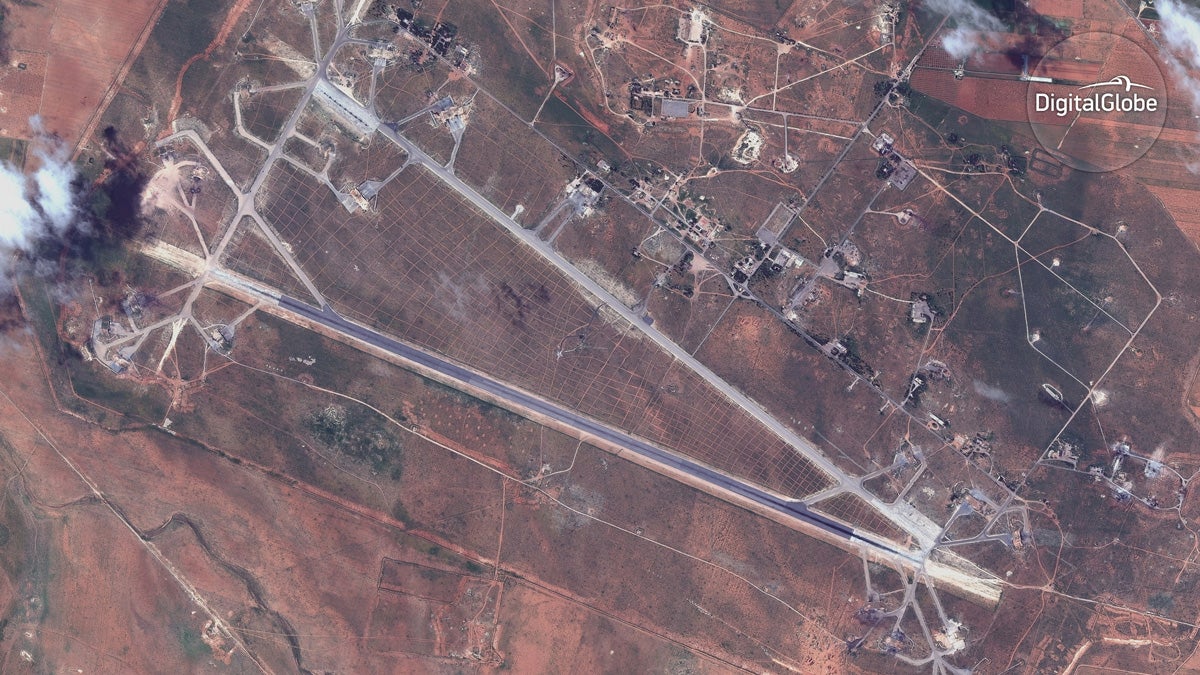Trump needs a coherent policy on Syria at home and abroad

This satellite image provided by DigitalGlobe shows an image captured on April 7 of the Shayrat air base in Syria, following U.S. Tomahawk Land Attack Missile strikes on Friday, April 7, 2017 from the USS Ross (DDG 71) and USS Porter (DDG 78). The United States blasted the air base with a barrage of cruise missiles on Friday, April 7, 2017 in fiery retaliation for this week's gruesome chemical weapons attack against civilians. (DigitalGlobe via AP)
As a presidential candidate, Donald Trump appealed to America’s worst tendencies of isolationism with his “America First” agenda. It appeared that his foreign policy (and large parts of his immigration policy) were simply built around the idea of defeating ISIS with airstrikes (which the Obama administration was already doing) and destroying Islamic terrorism (the definition of which, for some Trump supporters, was interpreted to mean the entire Muslim community).
Russia, whom Mitt Romney rightly described as our biggest geopolitical threat, was seen as an ally by candidate Trump. This rhetoric appears to be reinforced by close relationships between Trump associates and Russian officials. These relationships are rightly being investigated. Early administration actions demonstrated that the campaign rhetoric of isolationism and anti-Islamic terror would become policy.
Then, in a stunning reversal, Trump ordered a missile strike against the Syrian regime over their use of chemical weapons, to the consternation of his base and the satisfaction of many of his critics. Not only did this run counter to isolationism, but it was an engagement against a key ally of Russia.
Only time will tell the motivations behind this change. Was it to send a message to North Korea? Was it a one-time operation to demonstrate U.S. concern about chemical weapons? Was it a way for Trump to contrast himself with his predecessor, who did not launch strikes in a similar circumstances due to lack of congressional support? No one knows except the president and his advisers. However, conflicting statements from the U.N. ambassador and the secretary of state do not inspire confidence. If we are to assume that the strikes represent a reset in our Syria policy and will mean more engagement, then they warrant cautious support.
Syria has degenerated into a 21st century tragedy. What started as protests against the Assad regime has taken on the features of a variety of crises: a failed state in a volatile region, sectarian strife, resistance to a dictatorship, human suffering, and great powers in conflict. The situation has the potential to escalate into a global conflict. The United States is still the only nation capable of exerting the leadership necessary to bring resolution.
It’s going to take some time
American leadership does not and should not mean deploying combat troops to bring about American-style democracy by force, but a solution will not come quickly or easily. The president, Congress, and the American public need to understand that meaningful engagement must be a generation-long nation-building project. It requires a strategy with clear objectives, as well as a commitment of the necessary military, diplomatic, and economic resources to achieve success. Any strategy requires congressional deliberation and approval as well as public input.
Perhaps, it is time to discuss mandatory service in the U.S. National Guard and Reserves to check adventurism and close the military-civilian divide.
The mission in Iraq — with its changing goals of counter-terrorism, regime change, democracy-building, and stabilization operations, coupled with the expectation of quick victory, improper troop levels, and the demand for quick exit — provides an example of what our Syria strategy should not be.
Instead, America’s involvement in Bosnia in the ’90s might be a better guide, with its use of diplomacy backed by multinational peacekeepers to allow for co-existence among different ethnic groups. Following this course of action, America’s roles might include: leveling the “playing field” with a no-fly zone; providing military and economic support for refugee operations; training a moderate Syrian force to bring warring parties and their regional supporters into negotiations and to police against extremists; and leading a multinational force to create the safe zones that Hillary Clinton spoke about in 2016 and maintain any peace accords.
Reigning in domestic policy to get foreign policy right
Just as former President Bush put aside domestic priorities for the sake of foreign policy, so must Trump. The anti-Muslim rhetoric must end so that we can build alliances in Syria rather than create enemies. The president must not just allow for Syrian refugees in the U.S. but also work with other Western countries to ensure a global process that is humane, safe, and orderly. Even the border wall rhetoric, anti-free trade rhetoric, and any other advice from the alt-right must end to build international good will.
Americans also must be prepared for further assaults at home. The risk of terrorism will increase. So will the risk of cyber-attack, since our actions in Syria will find us at odds with three bad cyber-actors, Russia, Iran, and the Assad regime.
Trump did not create the crisis in Syria. Nor did a plurality of Americans even prefer candidate Trump to be in the position to make decisions on Syria. Yet President Trump’s term now will be defined by his actions in Syria. If the missile strikes become part of a comprehensive strategy, a trouble spot will be stabilized and United States leadership in foreign affairs will be maintained. However, if the strikes were simply a publicity stunt, then the United States’ ability to shape world affairs will be diminished.
WHYY is your source for fact-based, in-depth journalism and information. As a nonprofit organization, we rely on financial support from readers like you. Please give today.




